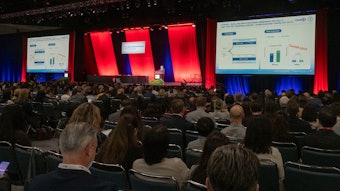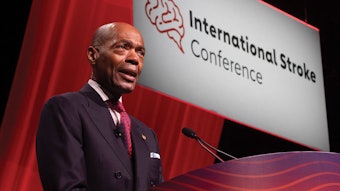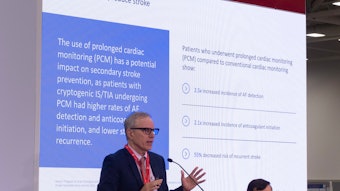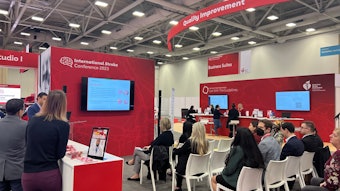Igniting hope for the future
Mariell Jessup, MD, FAHA, shared updates on initiatives that are helping stroke researchers and clinicians change the future of health.

During Wednesday’s Opening Session, AHA Chief Science and Medical Officer Mariell Jessup, MD, FAHA, acknowledged the city of Los Angeles and those impacted by the recent fires.
“Amid this profound tragedy, our souls were lifted by the firefighters, paramedics, neighbors and so many others stepping up to help those in need,” she said. “Moments like these require us to hold space in our hearts for both the grief of what’s been lost, and the hope for a brighter future. We see this same sentiment reflected in stroke care.”
Citing the recent Circulation article “Forecasting the Burden of CVD and Stroke in the United States Through 2050” Jessup said stroke prevalence could double by 2050. However, she reported that deaths from stroke have been reduced by one-third since the creation of the American Stroke Association. She outlined several initiatives that are helping stroke researchers and clinicians change the future of health:
- In its 20th year, the association’s Get With The Guidelines-Stroke program, is providing lifesaving care protocols for more than 8 million patient encounters across 2,800 hospitals. “These improvements in stroke care quality have led to an increase of over 71,000 quality-adjusted life-years since the program launched,” she said.
- The Leona M. and Harry B. Helmsley Charitable Trust has made a total commitment to the stroke mission of nearly $91 million, helping to make strides in rural communities.
- “To continue our work to translate science into improved patient outcomes and care, we’ve launched a new $2 million project supported by Stryker,” Jessup said. “Over the next two years and across 15 U.S. sites, the initiative will inform quality improvement recommendations for minimally invasive surgical evacuation for hemorrhagic stroke patients.”
- Jessup announced a commitment of nearly $13 million focusing on stroke as a systemic and chronic disease, powered by the support of the Henrietta B. and Frederick H. Bugher Foundation. “This significant new research effort will kick off with a Future of Stroke Symposium next year and brings Bugher’s lifetime commitment to our mission to more than $63 million,” she said.











